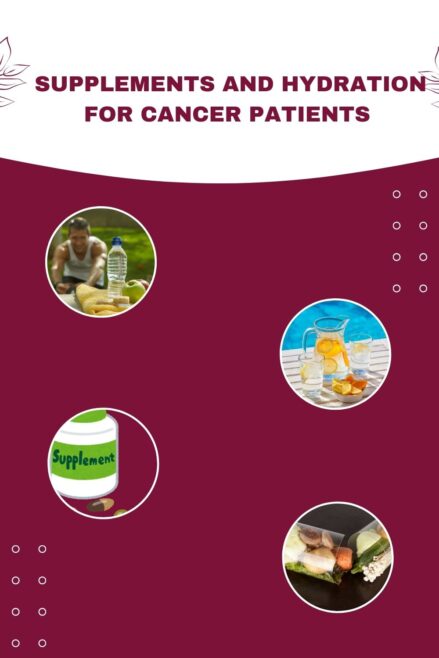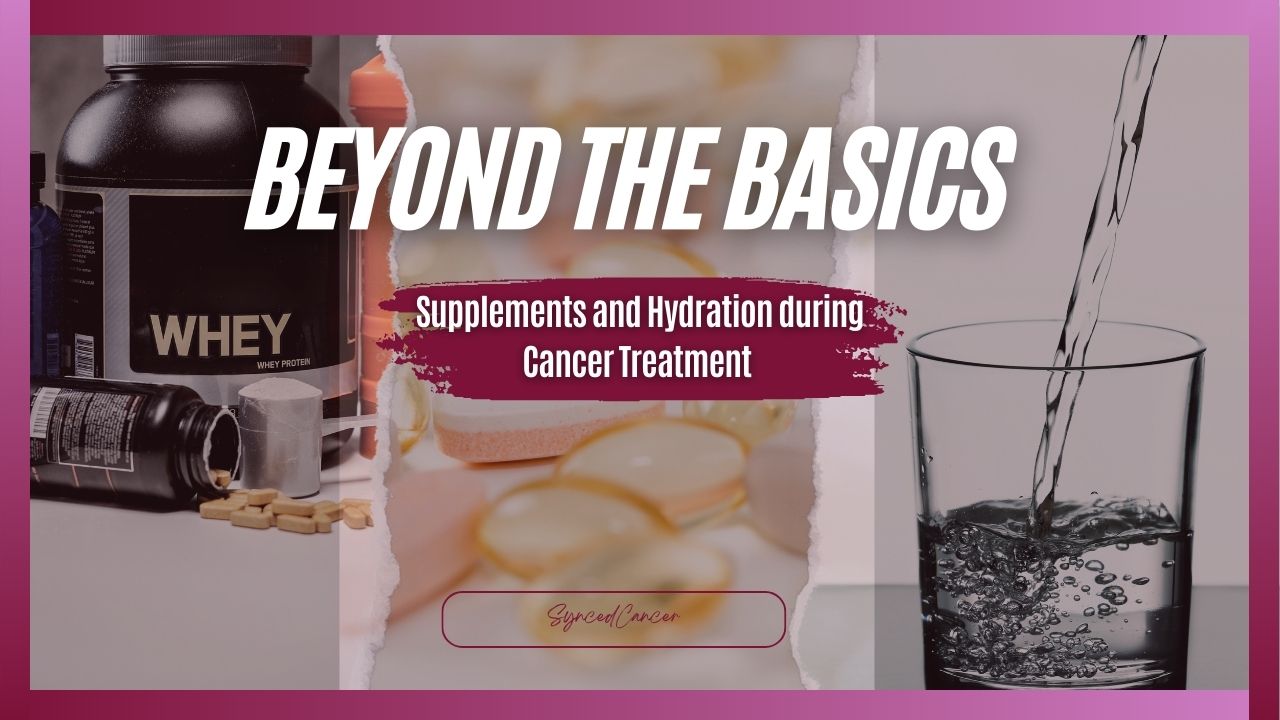Cancer treatment often brings challenges to the body, resulting in side effects like fatigue, nausea, and changes in appetite. In addition to conventional medical treatments, such as chemotherapy and radiation therapy, many cancer patients explore complementary approaches to support their overall well-being. Two key areas of interest are supplements and hydration, which can play vital roles in managing symptoms and promoting recovery.
This blog post delves into the importance of supplements and hydration for cancer patients, discussing their potential benefits, considerations, and best practices.
Supplements for Cancer Patients
- Nutritional Support: Cancer and its treatments can lead to malnutrition, making it essential for patients to maintain adequate nutrient intake. Supplements such as multivitamins, omega-3 fatty acids, and protein powders can help fill nutritional gaps and support overall health.
- Immune Function: Certain supplements, including vitamin C, vitamin D, and zinc, are believed to support immune function. Strengthening the immune system can aid in fighting infections and reducing the risk of complications during cancer treatment.
- Managing Side Effects: Various supplements, such as ginger for nausea and probiotics for digestive health, may help alleviate common side effects associated with cancer therapies. However, it’s crucial for patients to consult with their healthcare providers before starting any new supplement regimen, as some supplements may interfere with treatment or exacerbate existing conditions.

Hydration for Cancer Patients
Adequate fluid intake is especially crucial for cancer patients, as it plays a vital role in supporting their overall health and well-being during treatment and recovery. Find below the reasons ;
- Combatting Dehydration: Cancer treatments such as chemotherapy and radiation therapy can cause dehydration due to side effects such as vomiting, diarrhea, and decreased appetite. Dehydration can exacerbate symptoms, weaken the immune system, and lead to complications such as electrolyte imbalances and kidney problems. Therefore, maintaining adequate fluid intake is essential for cancer patients to prevent dehydration and support their body’s ability to cope with treatment-related challenges.
- Supporting Immune Function: Cancer treatment can weaken the immune system, making patients more susceptible to infections and illness. Adequate fluid intake is essential for supporting immune function, as it helps maintain proper blood circulation and lymphatic drainage. Hydration supports the body’s ability to produce immune cells and antibodies, enhancing its ability to fight off infections and reduce the risk of complications during treatment.
- Enhancing Nutrient Absorption: Many cancer patients experience changes in appetite and digestion, which can affect their ability to absorb nutrients from food. Proper hydration is essential for facilitating nutrient absorption and ensuring that the body receives essential vitamins, minerals, and antioxidants necessary for healing and recovery. Hydration supports gastrointestinal function, helping to alleviate symptoms such as bloating, gas, and indigestion.
- Alleviating Treatment-Related Symptoms: Cancer treatments such as chemotherapy and radiation therapy can cause mucositis, a condition characterized by inflammation and ulceration of the mucous membranes lining the digestive tract. Adequate fluid intake can help soothe and hydrate these inflamed tissues, providing relief from pain and discomfort associated with mucositis. Similarly, staying hydrated can help minimize the severity of other treatment-related side effects, such as dry mouth and sore throat.
- Electrolyte Balance: Cancer treatments such as chemotherapy can disrupt electrolyte balance in the body. Patients may benefit from electrolyte-rich beverages, such as coconut water or sports drinks, to replenish lost electrolytes and maintain hydration levels.
- Improving Quality of Life: Maintaining proper hydration can significantly improve the quality of life for cancer patients by reducing treatment-related symptoms and enhancing overall well-being. Adequate fluid intake supports energy levels, cognitive function, and emotional resilience, helping patients better cope with the physical and emotional challenges of cancer treatment. By prioritizing hydration, cancer patients can optimize their body’s ability to heal and recover, ultimately improving their quality of life during and after treatment.
- Water Intake Guidelines: Cancer patients should aim to drink adequate amounts of water throughout the day, typically about 8-10 glasses, unless otherwise instructed by their healthcare providers. Additionally, consuming hydrating foods such as fruits and vegetables can contribute to overall hydration levels.
It is therefore safe to assert that adequate fluid intake is essential for supporting the overall health and well-being of cancer patients throughout their treatment journey. By staying hydrated, patients can mitigate treatment-related side effects, support immune function, and enhance their body’s ability to cope with the challenges of cancer therapy. Healthcare providers should emphasize the importance of hydration and provide guidance on fluid intake strategies tailored to individual patient needs to optimize treatment outcomes and improve quality of life.
Considerations and Best Practices
- Individualized Approach: Each cancer patient is unique, and the suitability of supplements and hydration strategies may vary depending on factors such as cancer type, treatment regimen, and overall health status. Therefore, it’s essential for patients to work closely with their healthcare providers to develop personalized plans.
- Quality and Safety: When choosing supplements, patients should opt for reputable brands and products backed by scientific evidence. Additionally, patients should inform their healthcare providers about all supplements they are taking to avoid potential interactions with medications.
- Balanced Diet: While supplements can provide additional support, they should not replace a balanced diet rich in whole foods. Cancer patients should prioritize nutrient-dense foods such as fruits, vegetables, whole grains, and lean proteins to meet their nutritional needs.
- Hydration Awareness: Cancer patients should pay attention to their body’s hydration cues and drink water regularly throughout the day. Keeping a water bottle handy and setting reminders can help ensure adequate fluid intake, especially during busy or stressful periods.
Conclusion
Supplements and hydration play crucial roles in supporting the health and well-being of cancer patients. Nutritional supplements can help fill nutrient gaps, support immune function, and manage treatment-related side effects, while proper hydration is essential for maintaining bodily functions and minimizing complications. However, it’s important for cancer patients to approach supplements and hydration with caution, seeking guidance from healthcare providers and adopting personalized strategies tailored to their individual needs. By incorporating supplements and staying hydrated, cancer patients can enhance their quality of life and better cope with the challenges of cancer treatment.
REFERENCES
Leukemia Lymphoma Society – https://llsnutrition.org/hydration-and-cancer/
Assessed 9th April, 2024



What do you think?
It is nice to know your opinion. Leave a comment.